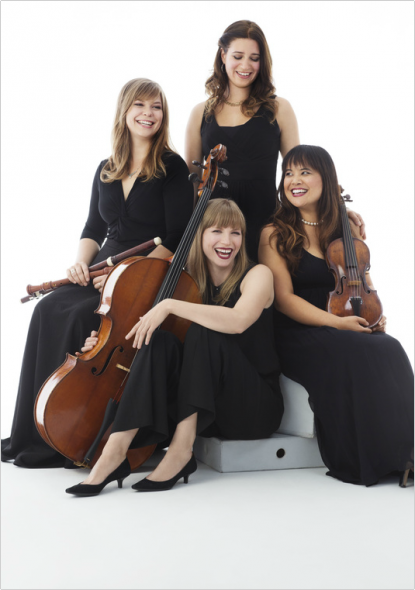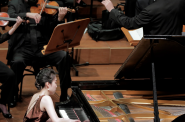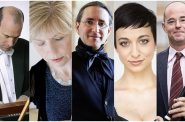A Baroque Music Murder Mystery
Who killed famed French composer? Concert queries with great music.

Standing Rona Nadler (harpsichord). Seated L to R – Alexa Raine-Wright (baroque flute and recorder), Sallynee Amawat (baroque violin) and Andrea Stewart (baroque cello). Photo courtesy of Early Music Now.
Early Music Now will close a successful 30th season this Saturday evening with a concert featuring Infusion Baroque – a young ensemble of Baroque flute, violin, cello, and harpsichord which will perform French Baroque chamber music.
The group won Grand Prize in the 2014 Early Music America Baroque Performance Competition held every two years to encourage ensembles of new musicians. The awards include a guaranteed engagement with six premiere “presenting organizations”, including Milwaukee’s Early Music Now. Founded in Montreal in spring 2013, Infusion Baroque won that competition by blending performance skills with innovative ways to communicate with its audiences. So the Milwaukee audience will be winners as well.
The Infusion Baroque’s novel current program weaves a lively investigation of the murder of Jean-Marie Leclair (1697-1764) into performances of his trio sonatas, along with work by his talented rival, Jean-Pierre Guignon and a number of others who composed and performed virtuoso violin in the heady days of French King Louis XV.
Leclair was murdered one night in a seedy neighborhood in Paris. His murder was never solved. However unlikely, the possible involvement of one of his professional competitors, the event allows an opportunity to speculate about the rivalries of the day and to introduce music by several other contemporary composers. With audience participation, more likely murderers are introduced as well. Ensemble Violinst Sallynee Amawat comments; “With our games and our acting, we just want to make the audience feel like they are connected to us and that we are connected to them.”
For Harpischordist Rona Nadler, beyond the abstraction that music can be for some, “having some other elements in the performance helps people to feel the experience more strongly.” And flutist Alexa Raine-Wright adds historical context: “In more recent music, composers were seen as gods, the most important part of music, writing every single dynamic… but in Baroque music, the composer was often as much a performer as a person who wrote the music.”
Less than 50 years after the development of the violin, the Stradivari family were producing arguably the perfect realization of the instrument. And shortly thereafter, late Baroque music featuring the virtuoso violin was extremely popular, particularly in the French court. Leclair, for a time the leading musician of the court of Louis XV, created the “French school” of violin performance – emphasizing the dance qualities of composition. Leclair was one of a small number of virtuoso players whose talents were the basis for aggressive competition as well as the inspiration for compositions meant to show off those skills.
Styles of composition developed in Italy were challenged by adaptations to a French style. Each style had rabid fans. Introduction of new techniques for virtuoso playing added interest. This mix of personal rivalries, championing of Italian and French styles and inventions that advanced the art of virtuoso violin seem useful opportunities to explore this genre and learn more about the nuances of this important era.
Leclair’s work pressages a shift from the complexity of the late Baroque era to a simpler, more song-like galant style. The music is light, offering pleasant listening. Infusion Baroque has been described as “dynamic and alive” with a stage presence that is “poised and elegant.” I like their mix of instruments. Although the violin will often be featured, the baroque flute also adds interest and excitement to the mix.
The concert will take place on April 22 (Saturday) at 7:30 p.m. at St. Paul’s Episcopal Church, 914 E. Knapp St. in downtown Milwaukee. The complete program, including texts and contextual notes, is available online. There will be a pre-concert lecture at 6:30 p.m.
Tickets may be ordered online. Tickets may also be ordered by phone at 414-225-3113 or by mail at Early Music Now, 759 N. Milwaukee St. #420. Individual adult/senior tickets for Tier 2 and Tier 3 seating range in price from $29 to $46, with student tickets ranging from $10 to $15.
Preview
-
PianoArts Festival Features Rising Stars
 May 28th, 2024 by Michael Barndt
May 28th, 2024 by Michael Barndt
-
Four Nations Ensemble Goes For Baroque
 May 13th, 2024 by Michael Barndt
May 13th, 2024 by Michael Barndt
-
Mozart on Prospect Avenue
 May 9th, 2024 by Martha Brown
May 9th, 2024 by Martha Brown




















Infusion Baroque is wonderful – everyone will be pleased with their performance! And they have a new CD of Bach works, too!